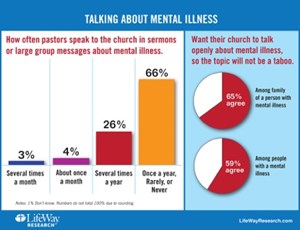Just over a year ago, a Christian family that has struggled with severe mental illness in their family circles for many years decided to donate a large sum of money to fund research into acute mental illness and the Christian faith. Their burden and passion was to help sufferers, but also to help families and churches minister more truthfully, graciously, and effectively to the mentally ill.
The first installment of that research was recently published by LifeWay and many media organizations have reported the results, much to the family’s joy. They are also looking forward to the next steps: an academic paper that will help seminaries and churches train pastors and a popular-level book that will help Christians everywhere understand mental illness better and serve those suffering with it more skillfully.

In this article I want to comment on a few of the more general findings from the research and in a second article, I’d like to zoom in on the core issue of the research, which concerned salvation and the mentally ill. But first, here are some of the research results that intrigued me.
“59% of pastors have counseled one or more people who were eventually diagnosed with an acute mental illness.”
Only 59%? Given the prevalence of mental illness in society (somewhere between 15-25% of the population will suffer an acute mental illness at one point in their lives), I was stunned that this figure was not 100%.
Does this imply that many people do not trust their pastors to offer reliable counsel when suffering in this way, and therefore turn to non-pastors for help instead? If so, perhaps some pastors need to ask themselves, “What can I do to equip myself better?” and also “How can I communicate understanding, sympathy, and compassion to such people so that they will come to me for counsel?”
“22% of pastors agree that they are reluctant to get involved with those dealing with acute mental illness because previous experiences strained time and resources.”
Read the rest of my analysis at Ed Stetzer’s blog.